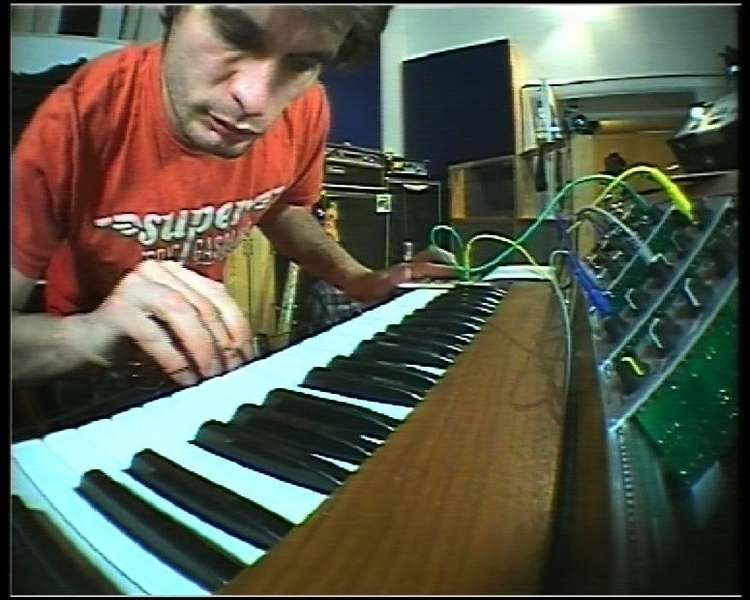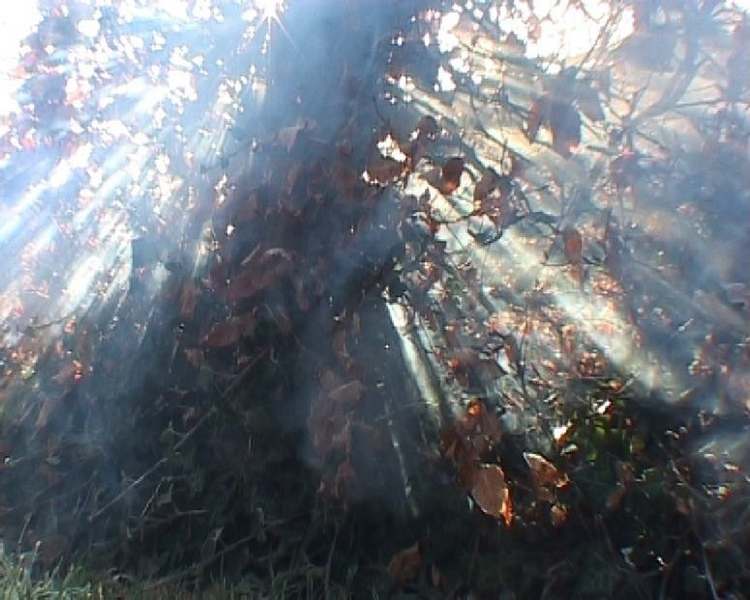
RADIOHEAD
DEAD
AIR
SPACE

Best Foot Forward
Earlier this year we asked an Oxford company called Best Foot Forward to look at the carbon and ecological footprints of two recent Radiohead tours, with the aim of reducing our carbon output. Touring is very important to us, a large part of the joy and passion of what we do, and we are committed to finding more responsible ways of doing it.
We asked Best Foot Forward to compare two different kinds of tours we've done recently in America: an out of town 'big gig'/amphitheatre tour, and a smaller theatre tour in city centres.
We wanted to find out which kind of touring has the lowest carbon and environmental impact 'per person entertained'. We had lots of information to work out our own carbon footprint, but we had to make some assumptions about the fans' footprint; how they travel, and how much beer they drink when they get to the show!
This is what we found:
Short of no-one coming to see us, we'd like to share with our fans some ways of reducing this - our early research suggests that how you come to our shows can significantly reduce the tour's carbon output. To help achieve better results, we're trying to play as many shows as possible in city centres because of their better transport links. From the Best Foot Forward report, the rough figures below give you an example of how much of a difference you can make.
For the big shows:
Where we can, we will be reducing our own carbon emissions, starting with sea freighting our gear. It's 93% more efficient than air freighting, and if we ship our equipment to and from America, we save 47 tonnes of CO2. We will be doing this for touring in 2008, along with travelling as little as possible by air, avoiding chartered flights, and investigating more efficient road and rail transportation.
You can download the whole report here.
We're aware that this study is tentative and partial, but it's a start, and we'll share with you more information as we get it.
Love
We asked Best Foot Forward to compare two different kinds of tours we've done recently in America: an out of town 'big gig'/amphitheatre tour, and a smaller theatre tour in city centres.
We wanted to find out which kind of touring has the lowest carbon and environmental impact 'per person entertained'. We had lots of information to work out our own carbon footprint, but we had to make some assumptions about the fans' footprint; how they travel, and how much beer they drink when they get to the show!
This is what we found:
- Fan travel and consumption made up 86% of the Theatre tour and 97% of the Amphitheatre tour.
- Of the band's touring impact - Travel and energy use accounted for 60% (Theatre tour) and ~40% (Amphitheatre tour)
- International travel accounted for a further 34 - 40% of impacts.
Short of no-one coming to see us, we'd like to share with our fans some ways of reducing this - our early research suggests that how you come to our shows can significantly reduce the tour's carbon output. To help achieve better results, we're trying to play as many shows as possible in city centres because of their better transport links. From the Best Foot Forward report, the rough figures below give you an example of how much of a difference you can make.
For the big shows:
- If average car occupancy increased from 2.2 to 3, the whole tour's overall CO2 output would be reduced by 22%.
- Halving fans flying would reduce overall CO2 consumption by 5%
- And if 10% of car users travelled by bus it would reduce CO2 emissions by 7%
Where we can, we will be reducing our own carbon emissions, starting with sea freighting our gear. It's 93% more efficient than air freighting, and if we ship our equipment to and from America, we save 47 tonnes of CO2. We will be doing this for touring in 2008, along with travelling as little as possible by air, avoiding chartered flights, and investigating more efficient road and rail transportation.
You can download the whole report here.
We're aware that this study is tentative and partial, but it's a start, and we'll share with you more information as we get it.
Love
Colin
19 December 2007
Archive
- MARCH 2016
- New Radiohead Dates Announced
- DECEMBER 2015
- Spectre
- DECEMBER 2014
- Tomorrow's Modern Boxes on Bandcamp
- OCTOBER 2014
- humor
- SEPTEMBER 2014
- Tomorrow's Modern Boxes
- Polyfauna 2.0
- JULY 2014
- office chart for the birds
- JUNE 2014
- Weatherhouse
- APRIL 2014
- TOdAy's MAtchsticks
- MARCH 2014
- more pissing in the wind on a Monday... office chart
- FEBRUARY 2014
- Childish Things
- PolyFauna
- JANUARY 2014
- Independent Venue Week
- Office chart
- OCTOBER 2013
- Mr Russell Brand
- Office Tea Party
- AUGUST 2013
- PALE BLUE DOT
- JULY 2013
- The Sounds of South Africa on 6
- JUNE 2013
- office chart , if theres a heaven then..
- MAY 2013
- Sunday Drift Office Chart
- Stanley Donwood draws trees.
- Some good sounds on old technology
- Office Chart sssstrange winds, sharp ends
- APRIL 2013
- Walking to the North Pole
- MARCH 2013
- What have you done to my face?
- ATOMS FOR PEACE tour update
- Atoms For Peace
- FEBRUARY 2013
- Ingenue
- JANUARY 2013
- Children's Radio Foundation - Colin's trip to South Africa
- Next Atoms for Peace Single
- DECEMBER 2012
- In Sydney with the ACO
- AMOK
- OCTOBER 2012
- Strasbourg Soundcheck
- Soundcheck in Bercy
- Office Chart from London to Paris
- SEPTEMBER 2012
- greenpeace - save the arctic
- The Master
- Atoms for Peace
- AUGUST 2012
- The Scott Johnson Bursary Fund for Young Musicians
- JULY 2012
- _
- LIke ripples on a blank shore.
- fragile
- JUNE 2012
- Rescheduled European Dates
- European Shows
- Scott
- Toronto Show Cancelled
- Bologna, Italy - change of venue
- MAY 2012
- office chart ...out from under a blanket
- Lost Angeles
- Dot Connectors
- One Little Plane - " Into the Trees "
- MARCH 2012
- Penderecki in London
- Soundchecks
- FEBRUARY 2012
- Office Chart
- JANUARY 2012
- sysex office chart
- The Island President
- DECEMBER 2011
- The Daily Mail / Staircase
- Unicef on Climate Change in Zambia
- Three more dates
- NOVEMBER 2011
- A New Tour Date Added
- More Remixes and European Dates
- Radiohead: From the Basement - on DVD and BluRay
- Good Luck Rainbow Warrior
- Touring 2012
- dominoes
- OCTOBER 2011
- Children's Radio Foundation
- Hello Fluffy
- Philip's solo shows at Pegasus Theatre
- Thom's Boiler Room set
- More radio appearances from the members of Radiohead
- TKOL RMX 1234567 RELEASE
- SEPTEMBER 2011
- New York Update
- Last in the series, out on Monday
- New York, New York
- office chart in high winds
- On the Radio
- RMX Number 6: Modeselektor & Objekt
- Poland
- AUGUST 2011
- Remix: issue number 5
- doing something
- Remix Series, issue number 4
- Real vs Astroturf?
- office chart
- JULY 2011
- Remixes by Lone, Pearson Sound and Four Tet
- The King of Limbs - From The Basement broadcast
- Bloom in Glastonbury
- Nathan Fake/Harmonic 313/Mark Pritchard remixes
- news international r.i.p.
- Caribou/Jacques Greene Remixes
- JUNE 2011
- fuselage
- _
- Radiohead - Staircase (live From The Basement)
- post plastic people hopeful office chart
- Domino Records Radio Week
- M O V InG PLaNet .orgXXX
- The King of Limbs Remixes
- MAY 2011
- RIP Gil Scott-Heron
- office chart against antimatter
- APRIL 2011
- WILD
- Record Store Day
- Stand UP for Japan Charity Evening
- Japan
- MARCH 2011
- The Universal Sigh
- FEBRUARY 2011
- The King of Limbs
- Radiohead - Lotus Flower
- THANK YOU FOR WAITING
- office chart...
- The Dignity Revolution
- JANUARY 2011
- office chart
- Radiohead Haiti Benefit Unofficial DVD
- NOVEMBER 2010
- COP 16
- The Eraser King Cnut in Brighton for Earth350
- Earth350
- written translation
- 2 minutes silence
- office chart.. tea bags for the fly over lands
- OCTOBER 2010
- Haunted Air
- office chart.. for autumn.. if u have that
- horizontals ..
- JULY 2010
- In the Shed
- JUNE 2010
- Greetings from Philip
- office chart ..
- office chart ..
- Unless
- Bp's New Logo!
- Office Chart for a week off
- MAY 2010
- office chart ..
- if you want it
- out of office autoreply
- BP again
- APRIL 2010
- wake up walk out
- MARCH 2010
- mr sensible strikes a pose
- a shift in the weather? (chart)
- Happy Birthday
- Mark Linkous RIP
- 1 2 3 4 .... Chieftain Mews anyone?
- 6 Music
- sticky Tar Chart rant
- FEBRUARY 2010
- Ticket Info
- ?????? New Shows
- _
- Tony Juniper/ Cambridge Corn Exchange
- a week of number 13s
- JANUARY 2010
- Radiohead for Haiti
- Radiohead for Haiti
- Willie Mitchell RIP
- DECEMBER 2009
- christmas eve
- A rant and some other stuff
- _
- copenhagen climate summit
- expo
- ditto
- confused?
- a display of rhetoric
- not finished
- America shall? or .....should?
- Copenhagen Summit Global Youth Panel
- Denial Denial
- office chart .. one for the road
- NOVEMBER 2009
- THE WAVE
- 'as the landscape dissolves...'
- as i sweep up the last of the leaves
- nuclear power no thanks
- OCTOBER 2009
- happy f***in halloweed
- Steve Mason in the Studio
- Century of piano
- Room Music
- Hey what are you doing tomorrow night?
- SEPTEMBER 2009
- ??????
- office chart for grey dewy mornings
- age of StuPid StupID StuPid
- FeelingPulledApartbyHorses/ TheHollowEarth 12inch
- AUGUST 2009
- Life on Earth Soundtrack
- These Are My Twisted Words in Austria
- These Are My Twisted Words
- Jonny in Oxon
- Harry Patch (In Memory Of)
- Thom and Jonny in the Abbey
- JULY 2009
- Merce Cunningham 1919 - 2009
- Thom and Jonny and Drew in Ondes
- All for the best
- SUNDAY TELEGRAPH PRINTS WRONG HEADLINE
- JUNE 2009
- Office Chart (for Virgilio Anderson, instead of rain...)
- Nigel in the Studio
- Jonny in Check
- Thom in LA
- Tiny Vices Blog
- Digital Downloads
- Office Chart
- uptightmiddleclassnimbymonkeys
- MAY 2009
- office chart for friday
- for US citizens (mostly)
- For Uk citizens only ( sorry )
- bank holiday
- APRIL 2009
- Ed and Thom and Phil in Mexico City
- Thom in Mexico City
- Roland in Mexico City
- R.I.P. J.G. Ballard, 1930-2009
- Ed and Phil in Buenos Aires
- Tibetans sentenced for taking part in protests in March 2008
- More South America Pinholios
- MARCH 2009
- Rio
- Mexico pinholes
- FAC
- Office chart for South America
- Tibet March in London today
- FEBRUARY 2009
- Jamais
- This week's office chart
- business trip
- "I've been blown about for years"
- JANUARY 2009
- hi beck hows it going? hope you're well.
- a horned reptile that is crawled upon the earth
- this weeks office chart
- back to the office
- DECEMBER 2008
- Rest in Peace Dear Oliver Postgate
- Christmas Skanking at Duncan's
- Ed in London
- NOVEMBER 2008
- this weeks office chart
- Ed & Philip will join the new Seven Worlds Collide project
- Saitama Arena, Tokyo
- did i fall or was i pushed?
- OCTOBER 2008
- Ed in Manchester
- Thom and Colin in Tokyo
- Jonny in Tokyo
- Saitama Arena, Tokyo
- Ed and Jonny in Tokyo
- tokyo
- choose high quality!
- _
- Japan
- Video for Reckoner
- SEPTEMBER 2008
- Jonny in Boston
- Ed and Colin in San Diego
- Thom and Jonny in America
- Reckoner Remix
- Colin in Lancaster
- Reckoner
- Ed in Vancouver
- Phil in Los Angeles
- Thom in Los Angeles
- Jonny in Germany
- Ed,Thom, Colin and Phil, Europe
- Thom in House of Cards, Florida
- Ed in Berlin
- Jonny in Europe
- Thom in the US
- Jonny, Ed and Adam in Nimes
- Philip and Jonny in Nimes
- Ed in Nimes
- duncan's case
- Bangers and Mash
- Thom 'Eraser' Yorke introduces Kieran ' Burial ' Hebden....
- No one will play scrabble with Jonny
- AUGUST 2008
- Goodnight from Santa Barbara
- Santa Barbara
- Might come in handy.
- Muckleshoot
- Toronto Soundcheck
- close encounters
- pinholes from america
- Video Competition Winners
- philadelphia
- JULY 2008
- HOUSE OF CARDS
- Radiohead Lighting
- JUNE 2008
- Net Neutrality
- -
- __
- Glasgow Green
- malahide in rainbow
- One Little Plane - "Until"
- How I learnt to post on Dead Air Space
- MeeBOX
- Video contest
- thom and Jonny playing the rip by portishead -
- Nude Remix Fun
- MAY 2008
- Found!
- Have you seen?
- What was in Duncan's Case...ahhh!
- BOok NOW_ No JETLAG
- Nissan Pavilion
- Rained on in Washington again
- Charlotte
- West Palm Beach
- Nude Remix
- The most gigantic flying mouth for some time.
- APRIL 2008
- Humph
- Remix Nude for Radiohead
- MARCH 2008
- Glasto environmentals mentals etc etc etc
- FEBRUARY 2008
- diamond hoo ha men
- how did you hear about us?
- Ryan McGinley on Tim Barber's site via New York Times
- RED BLUE GREEn +
- JANUARY 2008
- Tiny Vices
- thom and kevin w
- Thomlooksup...
- Ed Becks McClaren
- philnickbanksie
- Scotch Mist Explodes
- winter 08
- Raining again
- Jonny and Eddie
- which would you rather be doing ?
- Live on radiohead.tv
- Change of plan
- Webcast address
- In Store!
- jigsaw falling into place
- DECEMBER 2007
- scotch_mist
- F Y I_____ if you care
- scotch_mist
- Happy Season!
- __
- Best Foot Forward
- press
- Press
- press
- WEb Cam ED ON!
- WEb Cam ON!
- The End of The Beginning
- NOVEMBER 2007
- image is surface
- http://www.foe.co.uk/
- goodnight
- further research
- CLINIC IN FARNHAM 16.11.07
- OCTOBER 2007
- hard hats on..
- In Rainbows
- SEPTEMBER 2007
- untitled no.8
- untitled no.7
- untitled no.6
- untitled no.5
- untitled no.4
- untitled no.3
- untitled no.2
- untitled no.1
- JULY 2007
- goodmornin'vietnam
- blank space
- JUNE 2007
- a bit of tape from the studio
- a word from the studio
- Fear
- MAY 2007
- Rashaan Roland Kirk
- BBc vs Scientology
- Which Way?
- Today!
- APRIL 2007
- jonny in colour
- How does it go?
- What was that?
- It goes like this
- Friends of the earth
- Over your shoulder....
- What are these called?
- NS10sAe1s
- Happy Birthday Ed!
- " "
- on and on and on
- Ed and Phil
- in the room
- Winter 07 London
- a wee treap doon memori lane
- Just Like You
- Jesus Loves You
- A big fan of the Congoes
- Don't Look Now
- Mr D at his Desk
- mental note
- Api Desk
- tea break
- MARCH 2007
- smiley face
- Medium format
- Arpeggi
- Back at the House
- Mixing It
- At the House
- .
- Winter 07 London
- .
- todays tears
- Studio Photographs
- Review of Nick Cohen's " What's Left "
- ha ha ha ha click oh
- Studio Photographs
- mood music
- the fog of war
- FEBRUARY 2007
- global warming is an anti capitalist conspiracy?
- a parrallel universe
- dump nuclear
- 'Grave errors'
- True to Form
- \]]
- Doukutsu Monogatari
- who could i be talking about?
- .....wow, man, like, crazy.......
- Winter 07
- kingdom come
- A happy find
- in the conversation pit no4
- in the conversation pit no3
- more 2lines
- having just been elected in a landslide
- i have all the answers here in my pocket
- JANUARY 2007
- Solar Lunar Power Stations
- January 25th?
- I love Adam
- bangin'
- back at werk
- DECEMBER 2006
- hope for the future
- RMx! x
- RMx!
- visit sunny somerset
- you will have a cup of tea
- landscape with tent
- hold it there don't move an inch
- NOVEMBER 2006
- week offf
- What we did at the seaside (and elsewhere)
- nnn
- OCTOBER 2006
- Nigel
- Reasons to love the BBC No. 94*
- Studio
- if you are concerned about climate change
- SEPTEMBER 2006
- jonny guitar
- San Francisco to Amsterdam
- Amsterdam
- AUGUST 2006
- Amsterdam Two
- Amsterdam One
- paris, amsterdam
- after v.....
- if you are ever in lausanne, switzerland
- _as i go to sleep in lausanne_
- JULY 2006
- found this in old notes
- America
- america
- US
- why watch sky?
- JUNE 2006
- sandiego
- Chicago, San Francisco and San Diego Pictures
- Bonnaroo
- on the shitlist
- nashville
- grainy new york
- winter studio
- bussign
- boston 1stnight
- postcards
- copenhagentoboston
- MAY 2006
- coming off tune
- Thanks
- My mum
- !!!!
- Cancelled 2nd Night Show in Amsterdam
- copehagen
- APRIL 2006
- rehearsalweek
- rehearsalweek
- happy easter
- _______
- like anybody gives a rats arse:)
- MARCH 2006
- question for the minister
- la la land
- all i need
- wednesdayfifths
- tuesday, photos with spinksy
- excuse me i think theres somthing wrong with this
- FEBRUARY 2006
- Linda Smith
- bodysnatchers
- last day
- videotape
- videotape
- verylatenow
- wellverb
- arpeggi
- strings
- rehearsal
- nude
- i was looking for a drum machine and found this.
- If you cant beat em, join em.
- rehearsals
- rehearsals
- rehearsals
- rehearsals
- rehearsals
- shaky
- Flying car?
- the big
- JANUARY 2006
- whatever
- num num num
- NOVEMBER 2005
- Montreal
- OCTOBER 2005
- the dogs have gone to bed
- bananas
- two days off, sunday spent dragging a puppy around Abingdon.
- Nothing can bring peace..........but yourself
- in a house that may be or maybe not haunted
- SEPTEMBER 2005
- lots of loose ends
- storm coming
- good evening
- great web site
- andre 3000
- Clocking on again.
- AUGUST 2005
- final day in this session
- louis taken to pub after bvs
- louis on bvs
- three steps back. Undo, UNdo, Oh Shit, you can't
- blank
- p "ed" als
- sleepy
- Hey! I'm in an acoustic frame of mind....
- stroking some topiary...potato lakes
- here we go
- ...
- that was a long day
- mornin' m'lud
- ...
- ...tonight...
- ...go down...
- if you...
- Phil Spectral
- jonny on clav without chair
- lost in the woods
- devarahi rules
- announcement which may be of interest
- DO YOU HAVE 'FEAR OF MUSIC?'
- is anybody in there?
- is anybody there?




